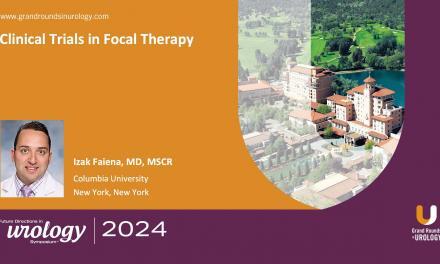Richard E. Link, MD, PhD, presented “Why Should a Clinician Care About 3D Printing, VR Simulators and Genetically Engineered Animal Models for Kidney Cancer?” during the 23rd Annual Innovations in Urologic Practice on September 14, 2018 in Santa Fe, New Mexico.
How to cite: Link, Richard E. “Why Should a Clinician Care About 3D Printing, VR Simulators and Genetically Engineered Animal Models for Kidney Cancer?” September 14, 2018. Accessed Nov 2025. https://grandroundsinurology.com/why-should-a-clinician-care-about-3d-printing-vr-simulators-and-genetically-engineered-animal-models-for-kidney-cancer/
Why Should a Clinician Care About 3D Printing, VR Simulators and Genetically Engineered Animal Models for Kidney Cancer? – Summary:
Richard E. Link, MD, PhD, discusses current challenges in the management of renal cell carcinoma (RCC), as well as research efforts to address these challenges. He specifically reviews 3D-printed models and virtual reality simulation for pre-surgical rehearsal and training, and an engineered animal model for identifying genetic targets in papillary RCC.
Abstract:
During the past decade, we have witnessed dramatic changes in the management of RCC. First, the application of minimally-invasive robotic surgery has addressed almost all T1 tumors in a nephron-sparing manner. A growing understanding of the genetic mechanisms underlying RCC has also driven expansion of targeted therapy options for advanced disease.
However, problems remain and provide fruitful areas for basic and translational research in this field. For instance, how do we teach the next generation of urologic surgeons to perform robotic partial nephrectomy in an efficient and safe manner as the complexity of these cases increases? Can we leverage new digital technologies to modernize our training programs? For patients with advanced RCC, particularly non-clear cell subtypes, 5-year survival remains abysmal. How can we reconcile the confusing morass of targeted systemic drugs and apply them more effectively individually, as well as in combination, to improve outcomes? Can we identify new gene and pathway targets to improve treatment by generating animal and cell-based models?
This presentation describes some of the ongoing research efforts at the Baylor College of Medicine to address these issues. One effort is to apply new technologies, particularly patient-specific 3D printing and virtual reality simulation, to accelerate the learning curve for robotic partial nephrectomy. These approaches allow presurgical rehearsal of complex cases and enhance the spatial understanding of tumor morphology critical for safe and efficacious surgery.
This presentation also outlines a four-year effort to develop a genetically engineered mouse model for papillary renal cell carcinoma. This model should yield new insights into the genetic drivers of tumorigenesis, allowing for the identification of new treatment targets and the facilitation of testing new therapeutic algorithms before moving on to lengthy and costly human clinical trials.
About Innovations in Urologic Practice
Innovations in Urologic Practice (IUP) is an annual CME-accredited conference devoted to updating urologists on the rapidly changing healthcare environment. Topics focus on innovative diagnostic and treatment strategies, controversies, new and currently developing technologies, and challenges in today’s urologic practice. Dr. Link presented this lecture during the 23rd IUP in 2018. Please visit this page in order to learn more about future IUP meetings.
ABOUT THE AUTHOR
Richard E. Link, MD, PhD, is a professor and board-certified and fellowship-trained urologist specializing in the treatment of urologic disease affecting the kidney, ureter, adrenal gland and prostate. Dr. Link holds the Carlton-Smith Endowed Chair in urologic education at the Baylor College of Medicine (BCM) in Houston, Texas and directs the BCM division of endourology and minimally invasive surgery. He serves as director of living donor procurement for several major kidney transplant programs in Houston, including Baylor St. Luke’s Medical Center, Texas Children’s Hospital, and the Houston Methodist Hospital. Dr. Link focuses on the use of laparoscopic, robotic-assisted, percutaneous, and endoscopic techniques to treat kidney and prostate tumors, benign prostatic hypertrophy, renal and ureteral obstruction, and urinary tract stones and has been an early pioneer in the development of laparoendoscopic single-site donor nephrectomy.
Dr. Link earned both his MD and PhD in molecular and cellular physiology at Stanford University in California and completed an internship and residency at BCM before completing a fellowship at The Johns Hopkins University School of Medicine in Baltimore, Maryland. Dr. Link also has a strong interest in applying single site robotic technology using the da Vinci SP platform to retroperitoneal and transvesical urologic surgery. He has published numerous papers and earned many awards, including the Fulbright and Jaworski LLP Faculty Excellence Award for Teaching and Evaluation at BCM.




